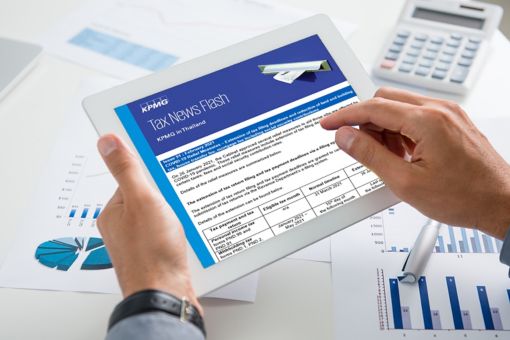New International Business Center regime to replace IHQ, ROH and ITC regimes
Tax & Legal News Flash Issue 54
On 28 December 2018, the Thai government gazetted Royal Decrees No. 671, 672, 673 and 674 to establish the International Business Center (“IBC”) regime as a replacement for the existing International Headquarters (“IHQ”), Regional Operating Headquarters (“ROH”) and International Trading Center (“ITC”) regimes. This development was previously announced by the Thai Revenue Department (“TRD”) on 10 October 2018, as discussed in Tax & Legal News Flash Issue 48 (available here). Existing beneficiaries of the ROH, IHQ and ITC regimes will be able to continue benefiting from the associated incentives under normal circumstances until the expiry date.

The new IBC regime, as established by Royal Decree No. 674 (“RD 674”), is largely consistent with the TRD’s previous announcement but includes some additional details. The key features of the IBC regime are summarized below.
Nature of IBC
An IBC is defined as a Thai company that operates a business of providing management services, technical services, support services or treasury management services to its affiliates, or operates an international trading business that meets the requirements specified by the Director-General of the TRD (details of these requirements are not yet available).
The definitions of “support services”, “treasury management services” and “international trading business” are given by RD 674 and are similar to existing definitions under the IHQ regime, with some alterations.
Further clarification is needed about the precise types of income that qualify for tax benefits under the IBC regime. For example, although the term “international trading business” is defined and included in the definition of IBC, RD 674 does not clearly specify the tax benefits that are available for international trading business income.
In addition, unlike the existing IHQ, ROH and ITC regimes, RD 674 does not explicitly require the IBC to provide services to foreign affiliates. Further confirmation is needed about whether an IBC will be permitted to provide services to Thai affiliates only.
Eligibility criteria
An IBC applicant must satisfy several requirements including:
- Having paid up share capital of at least THB 10 million on the last day of each fiscal year.
- Incurring annual operating expenditure related to the IBC’s business in Thailand of at least THB 60 million for each fiscal year. However, lower expenditure is permitted for existing beneficiaries of the ROH and IHQ regimes where those beneficiaries transition to the new IBC regime.
- Employing at least 10 people, or at least 5 people where the IBC performs only treasury management service activities. These employees may be Thai or foreign, but they must possess the knowledge and skills necessary for the IBC.
- Satisfying any additional rules, procedures and conditions that are imposed by the Director-General of the TRD.
If an entity with IBC status fails to satisfy these minimum requirements for one accounting period, it will not receive certain IBC benefits for that period. If the entity fails to meet the minimum requirements for more than one consecutive accounting period, the Director-General of the TRD has a claw back power to revoke the entity’s IBC status and recover all IBC tax benefits granted, plus potential penalties and surcharge, going back to the IBC’s first accounting period.
Tax benefits
Corporate income tax
IBCs are generally entitled to reduced corporate income tax (“CIT”) rates of 8%, 5% or 3% on their net profits from eligible IBC income, where the IBC’s annual expenditure in Thailand for each fiscal year is at least THB 60 million, THB 300 million or THB 600 million respectively. In addition, if the IBC transitioned from the existing ROH or IHQ regimes, it may qualify for the reduced CIT rate of 8% if its annual Thai expenditure is less than THB 60 million, provided that the Director-General of the TRD grants approval and other conditions are satisfied.
Dividend
Dividend income received by the IBC from its affiliates is exempt from CIT. In addition, qualifying dividends and interest paid by the IBC to foreign companies or other juristic persons not carrying on business in Thailand are also exempt from withholding tax (“WHT”).
Furthermore, qualifying dividends paid by an existing IHQ or ROH that transitions to the IBC regime to foreign companies or other juristic persons not carrying on business in Thailand are also exempt from WHT, provided that the dividends are paid within one year after the approval to transition is granted.
Specific business tax
Interest income that the IBC receives from its affiliates for treasury management services is exempt from specific business tax.
Personal income tax
Eligible expatriate employees of the IBC will be entitled to the reduced personal income tax flat rate of 15% that was available under the ROH and IHQ regimes. Details of the expatriate employees who are eligible will be prescribed in rules and regulations issued by the Director-General of the TRD, which are yet to be released.
Duration
Once an entity’s IBC application is approved, the above tax benefits will be available for 15 accounting years.
Termination of existing IHQ, ROH and ITC regimes
Royal Decrees No. 671, 672 and 673 impose end dates for the current IHQ, ROH and ITC regimes, and RD 674 provides a mechanism for IHQs and ROHs to transition to the IBC regime.
The IHQ, ROH and ITC regimes are now only available to applicants whose requests were submitted and approved (ITC and IHQ) or notified (ROH) by 10 October 2018. In addition, for some existing beneficiaries of the ROH regime, ROH tax benefits will expire around 2020.
KPMG’s comments
Although Royal Decrees No. 671 to 674 expand upon the Thai government’s previous announcement in October 2018, the new IBC rules are complex and there are a number of areas that require further clarification. KPMG is at the forefront of these developments, and we will continue keeping you informed of any new updates. We would also welcome the opportunity to advise taxpayers who are considering applying for the IBC regime, or who receive existing benefits under the IHQ, ROH and ITC regimes and may wish to transition to the IBC regime.
In addition, for Thai tax purposes, taxpayers should consider preparing local transfer pricing documentation and intercompany agreements to support the IBC’s provision of services to its affiliates. KPMG is well positioned to support you in preparing this documentation.
Connect with us
- Find office locations kpmg.findOfficeLocations
- kpmg.emailUs
- Social media @ KPMG kpmg.socialMedia


